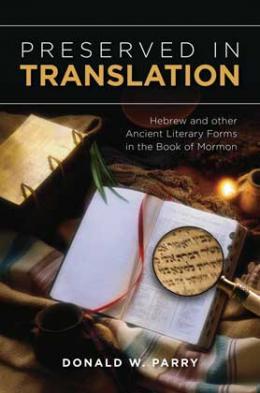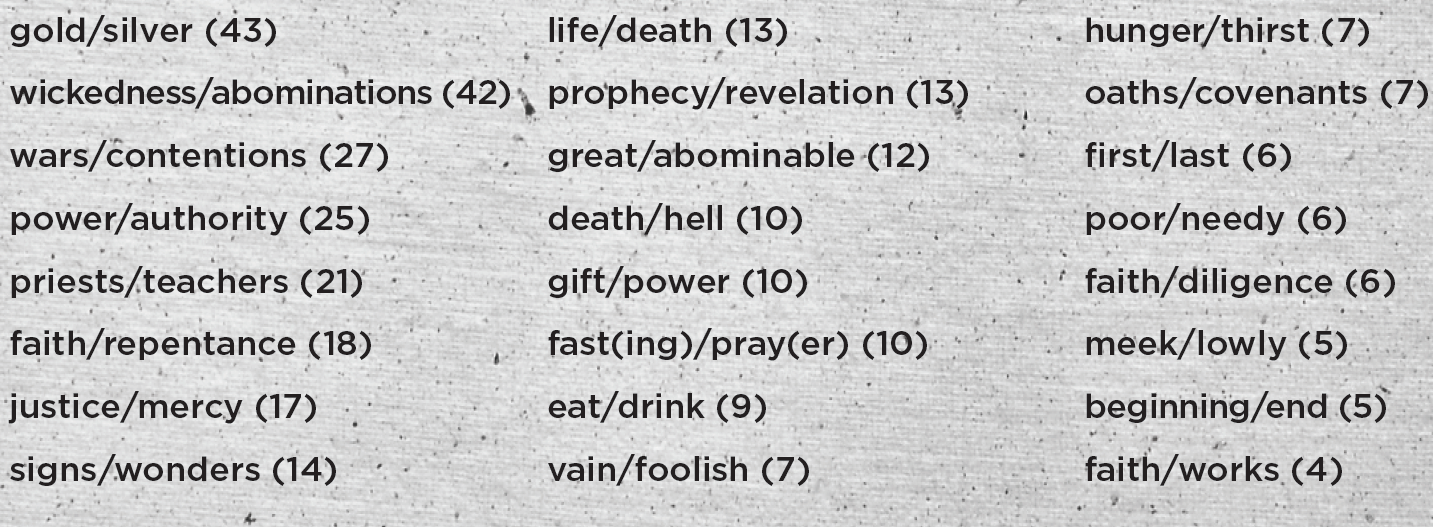Word Pairs
Donald W. Perry, “Word Pairs,” in Preserved in Translation: Hebrew and Other Ancient Literary Forms in the Book of Mormon (Provo, UT: Religious Studies Center, Brigham Young University; Salt Lake City: Deseret Book), 39‒44.
"by day and . . . by night" (2 Nephi 9:52)
The Old Testament features hundreds of word pairs. To qualify as a word pair in the Hebrew Bible, the words must be of the same grammatical class, must occur in parallel lines, and must occur frequently as a pair in the text.[1] In the parallelism “For I was my father’s son, tender and only beloved in the sight of my mother” (Proverbs 4:3), father and mother form a word pair. Another example from biblical poetry is “Hear, O heavens, and give ear, O earth” (Isaiah 1:2), with hear being paired with give ear.
Word pairs are also found in biblical prose, where they are generally joined by and.[2] In “He is thy life, and the length of thy days” (Deuteronomy 30:20), life and length of days form a word pair. And in the phrase “that cannot be numbered nor counted” (1 Kings 3:8), numbered is paired with counted.
The Book of Mormon has hundreds of word pairs that follow the same patterns as those in the Bible.[3] Here are some examples that are found in parallel lines:
Day and Night
Pray unto him continually by day,
and give thanks unto his holy name by night. (2 Nephi 9:52)
leading them by day
and giving light unto them by night. (1 Nephi 17:30)
A and he did thank and praise the Lord
B all the day long;
B and when the night came,
A they did not cease to praise the Lord. (Ether 6:9)
Note that the last example also forms a chiasmus. Day and night are also word pairs in the Old Testament—for example, Job 3:23, Psalm 19:2, and Isaiah 4:5.
Good and Evil
if they be good, to the resurrection of endless life and happiness;
and if they be evil, to the resurrection of endless damnation. (Mosiah 16:11)
there is nothing which is good save it comes from the Lord:
and that which is evil cometh from the devil. (Omni 1:25)
good according to his desires of good;
and the other to evil according to his desires of evil. (Alma 41:5)
They that have done good shall have everlasting life;
and they that have done evil shall have everlasting damnation. (Helaman 12:26)
For Old Testament examples of this word pair, see Genesis 2:9, 17; Leviticus 5:4; and Deuteronomy 30:15.
Hearken and Hear
Hearken unto us,
and hear ye our precept. (2 Nephi 28:5)
Wherefore, my brethren, hear me,
and hearken to the word of the Lord. (Jacob 2:27)
Hearken, O ye house of Israel,
and hear the words of me, a prophet of the Lord. (Jacob 5:2)
The word pair hearken and hear also appears in Job 13:6, Jeremiah 6:10, and Micah 1:2.
Soul and Heart
for his soul did rejoice,
and his whole heart was filled. (1 Nephi 1:15)
my soul is rent with anguish because of you,
and my heart is pained. (1 Nephi 17:47)
my heart sorroweth because of my flesh;
my soul grieveth because of mine iniquities. (2 Nephi 4:17)
my soul abhorreth sin,
and my heart delighteth in righteousness. (2 Nephi 9:49)
The Old Testament pairs heart and soul in Psalm 13:2 and 16:9 as well as in Lamentations 1:20.
The Book of Mormon has many other examples of word pairs. These include anger/
Side-by-Side Word Pairs in the Book of Mormon
In biblical studies a word pair refers to corresponding words with similar, synonymous, or contrastive meanings that appear in parallel lines. Their prevalence in Hebrew poetry and in other ancient literature shows they were useful stock expressions, especially in the creation of impactful parallelisms that could be easily composed and memorized.[*]
Formulaic word pairs can also take different forms, such as being joined by and and not occurring in parallel lines. Such side-by-side collocations occur in the Bible as well as in the Book of Mormon and make for useful study.
In surveying word pairs in Book of Mormon prose texts, James T. Duke identified eighty-one that occur side by side (i.e., conjoined with and) at least four times.[**] His list includes the following, along with their number of occurrences:
How are word pairs useful in the study of the Book of Mormon? Among other reasons, “substantial linkages tie these pairs to the language and culture of the Israelite people,” explains Duke. In this way word pairs have probative value regarding the claimed ancient origins of the Book of Mormon text.
Notes
[1] Baranowski, “Word Pairs.”
[2] See Baranowski, “Word Pairs.”
[3] On word pairs in the Book of Mormon, see Barney, “Parallel Word Pairs”; Tvedtnes, “Word Groups”; Duke, “Word Pairs and Distinctive Combinations”; and Tvedtnes and Barney, “Word Groups.”
[*] For technical discussions of word pairs generally and in the Book of Mormon, see Baranowski, “Word Pairs,” and Barney, “Parallel Word Pairs” in the bibliography.
[**] See Duke, “Word Pairs and Distinctive Combinations,” 38–40.

